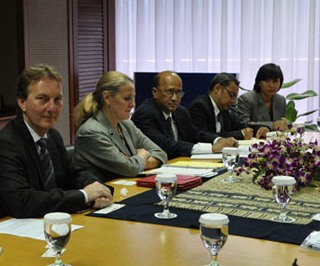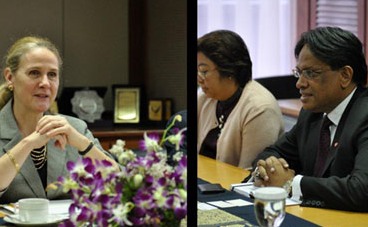 The World Bank has reaffirmed its support for the economic integration of the Association of Southeast Asian Nations (ASEAN), particularly now that the Asia-Pacific region is rapidly expanding.
The World Bank has reaffirmed its support for the economic integration of the Association of Southeast Asian Nations (ASEAN), particularly now that the Asia-Pacific region is rapidly expanding.
The two organizations strengthened their commitment to the partnership during a meeting between Sundram Pushpanathan, ASEAN’s Deputy Secretary-General for the Economic Community, and Pamela Cox, newly appointed World Bank Vice President for East Asia and the Pacific. The meeting was held last week at the ASEAN Secretariat office in Jakarta, Indonesia.
Pushpanathan expressed hope that the partnership would serve as a platform for knowledge exchange and partnership between the public and private sectors.
“ASEAN is a community of 600 million people, and we have been able to steadily improve the standard of living of our people over the past four decades. The positive developments in ASEAN have important implications not just for regional economics and politics, but also on a global scale,” he noted.
“The ASEAN-World Bank partnership will help ASEAN with its economic community building efforts and to transform the region into a competitive single market and production base with equitable development opening up more trade and economic opportunities for all,” added Pushpanathan.
Cox emphasized the importance of ASEAN as a convening body for the region that will facilitate sharing of knowledge and capacity-building in ASEAN countries.
She further stated that the World Bank remains strongly supportive of ASEAN as an important regional institution and looks forward to engaging in a more strategic knowledge partnership with ASEAN to share research on global best practice in development across the region.
ASEAN and the World Bank have had a long-standing partnership over the years, which was renewed through the ASEAN-World Bank Consultations in 2010, where the partners agreed on a number of key areas of cooperation.
Avenues for collaboration between ASEAN and the World Bank which are currently being explored include knowledge sharing, disaster management and risk insurance, trade facilitation for the newer ASEAN member-states, regional connectivity, food security, and regional integration monitoring.
Collaboration in these areas could take the form of analytical work, periodic thematic symposiums, and technical assistance programs.





